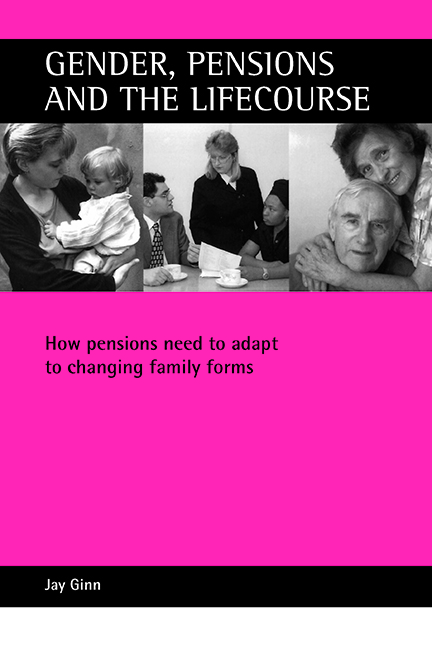Book contents
- Frontmatter
- Contents
- List of tables and figures
- Acknowledgements
- one Trends in gender relations, employment and pensions
- two Choice and risk in pensions: gender and class inequalities
- three Pension prospects for minority ethnic groups
- four Changing patterns of partnership: divorce and pensions
- five Impact of motherhood on pension acquisition: differentiation according to education
- six Gender and pensions in the European Union: towards an independence model?
- seven British pension policy: a gender perspective on alternative rescue plans
- References
- Appendix Statistical tables
- Index
five - Impact of motherhood on pension acquisition: differentiation according to education
Published online by Cambridge University Press: 20 January 2022
- Frontmatter
- Contents
- List of tables and figures
- Acknowledgements
- one Trends in gender relations, employment and pensions
- two Choice and risk in pensions: gender and class inequalities
- three Pension prospects for minority ethnic groups
- four Changing patterns of partnership: divorce and pensions
- five Impact of motherhood on pension acquisition: differentiation according to education
- six Gender and pensions in the European Union: towards an independence model?
- seven British pension policy: a gender perspective on alternative rescue plans
- References
- Appendix Statistical tables
- Index
Summary
The effect of raising children on British women’s employment, earnings and pension prospects was examined in Chapter Four, distinguishing according to partnership status. The analysis confirmed major divisions among women – between the child-free and those with dependent children and between partnered and lone mothers. Yet within these groups, women are further divided in terms of their human capital. Researchers have found a polarisation in British mothers’ employment, in which those with high educational qualifications and occupational experience are able to buy childcare services and further their career, whereas others are constrained in their employment options by low earning power and unaffordable childcare.
British women’s increasing levels of educational attainment have led to expectations of gender convergence in employment patterns and hence in lifetime earnings and pension income. As a growing proportion of women obtain graduate-level qualifications, they can expect to earn wages high enough to afford comprehensive childcare services. It is supposed that they will be able to maintain full-time employment after childbirth and maternity leave, matching men’s traditional pattern of full-time continuous employment. Thus, according to an important and influential Cabinet Office publication (Rake et al, 2000), the ‘motherhood gap’ in pensions – the difference between a childless woman and a comparable mother – will in future be negligible for young women with a degree or equivalent qualification. This conclusion echoes the finding of a computer-simulation exercise by Davies et al (2000), which indicated that for women with high educational qualifications motherhood would typically incur no pension loss, as their employment would be almost continuously full time across their reproductive years. These authors suggest that for a typical graduate mother “employment is hardly perturbed by bearing two children”, and that “part-time employment is limited for the mid-educated and negligible for graduates” (Davies et al, 2000, p 297). Rake et al (2000, p 85), drawing on these computer simulation results, conclude that the effects of child bearing are minimal for graduate women: “High-skilled mothers of two are estimated to remain continuously employed, with one year of part-time work following the birth of their second child.”
The simulation exercise by Davies et al (2000) is valuable in illustrating the consequences of motherhood for women’s incomes in later life and how these are likely to vary with educational level.
- Type
- Chapter
- Information
- Gender, Pensions and the LifecourseHow Pensions Need to Adapt to Changing Family Forms, pp. 69 - 82Publisher: Bristol University PressPrint publication year: 2003



